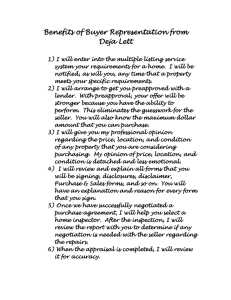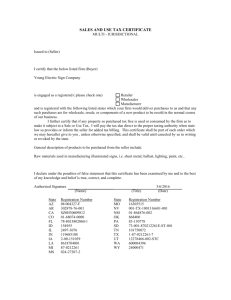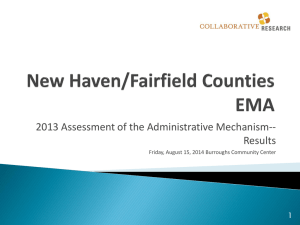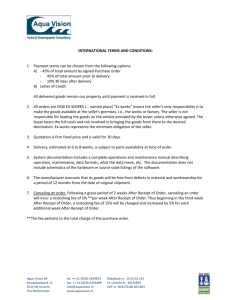Form - Capital Gains Worksheet
advertisement
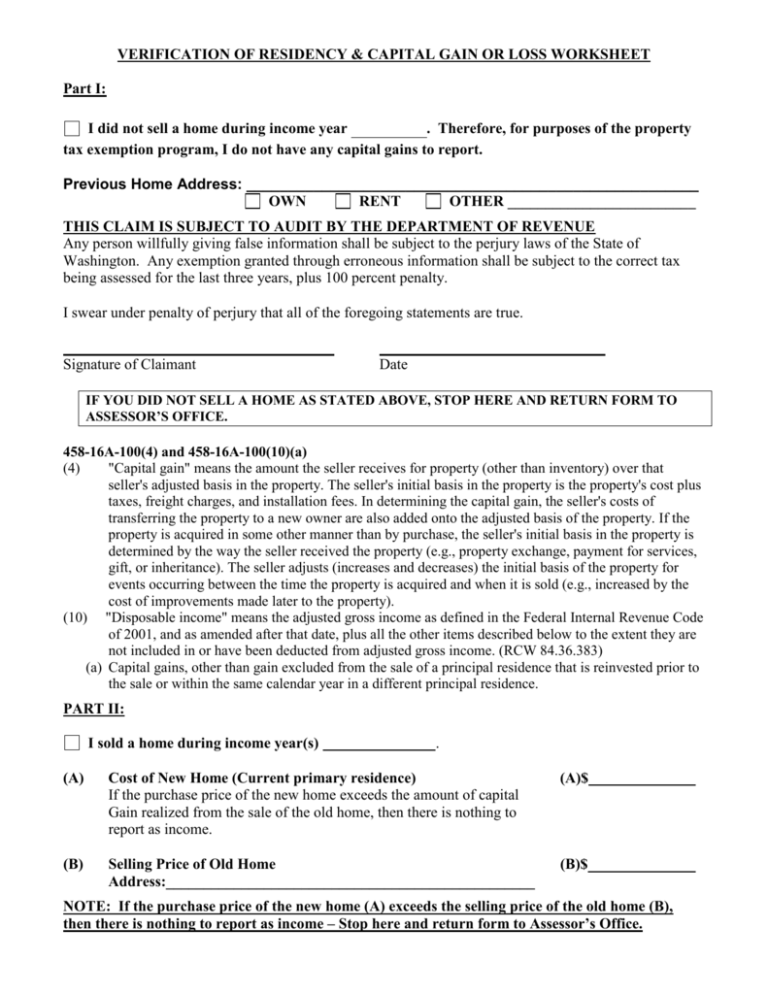
VERIFICATION OF RESIDENCY & CAPITAL GAIN OR LOSS WORKSHEET Part I: I did not sell a home during income year . Therefore, for purposes of the property tax exemption program, I do not have any capital gains to report. Previous Home Address: ______________________________________________________ OWN RENT OTHER _________________________ THIS CLAIM IS SUBJECT TO AUDIT BY THE DEPARTMENT OF REVENUE Any person willfully giving false information shall be subject to the perjury laws of the State of Washington. Any exemption granted through erroneous information shall be subject to the correct tax being assessed for the last three years, plus 100 percent penalty. I swear under penalty of perjury that all of the foregoing statements are true. Signature of Claimant Date IF YOU DID NOT SELL A HOME AS STATED ABOVE, STOP HERE AND RETURN FORM TO ASSESSOR’S OFFICE. 458-16A-100(4) and 458-16A-100(10)(a) (4) "Capital gain" means the amount the seller receives for property (other than inventory) over that seller's adjusted basis in the property. The seller's initial basis in the property is the property's cost plus taxes, freight charges, and installation fees. In determining the capital gain, the seller's costs of transferring the property to a new owner are also added onto the adjusted basis of the property. If the property is acquired in some other manner than by purchase, the seller's initial basis in the property is determined by the way the seller received the property (e.g., property exchange, payment for services, gift, or inheritance). The seller adjusts (increases and decreases) the initial basis of the property for events occurring between the time the property is acquired and when it is sold (e.g., increased by the cost of improvements made later to the property). (10) "Disposable income" means the adjusted gross income as defined in the Federal Internal Revenue Code of 2001, and as amended after that date, plus all the other items described below to the extent they are not included in or have been deducted from adjusted gross income. (RCW 84.36.383) (a) Capital gains, other than gain excluded from the sale of a principal residence that is reinvested prior to the sale or within the same calendar year in a different principal residence. PART II: I sold a home during income year(s) . (A) Cost of New Home (Current primary residence) If the purchase price of the new home exceeds the amount of capital Gain realized from the sale of the old home, then there is nothing to report as income. (A)$ (B) Selling Price of Old Home Address:_________________________________________________ (B)$ NOTE: If the purchase price of the new home (A) exceeds the selling price of the old home (B), then there is nothing to report as income – Stop here and return form to Assessor’s Office. Page – 2 (C) Enter all allowable sales expenses (Sales commissions, etc.) (See IRS Pub 523 for a list of allowable expenses) (C)$ (D) (D = B – C) (D)$ (E) Purchase Price of Old Home - if not included in Line (F) below (E)$ (F) Enter Increases or Decreases in Basis (See examples below) (F)$ (G) (G = E + F) (G)$ (H) (H = D – G) Capital Gain or Loss Realized Gain or Loss on Sale Adjusted basis of old home (H)$ PART III: (I) (I = H - A) Gain not re-invested (Enter -0- if negative amount) (I)$ Any gain that was not re-invested must be included in disposable income. A loss on the sale of the home cannot be deducted from income. It is a personal loss. See IRS Pub 523. DETERMINING ADJUSTED BASIS AND GAIN OR LOSS ON SALE See IRS Publication 523 for additional assistance. (IRS Pub 523) http:// www.irs.gov/publications/p523/ar02.html#d0e566 Selling expenses. Selling expenses include: • Commissions, • Advertising fees, • Legal fees, and • Loan charges paid by the seller, such as loan placement fees or “points.” Examples of Increases and Decreases to Basis Increases to Basis Capital improvements: Putting an addition on your home Replacing an entire roof Paving your driveway Installing central air conditioning Rewiring your home Assessments for local improvements: Water connections Sidewalks Roads Casualty losses: Restoring damaged property Legal fees: Cost of defending and perfecting a title Zoning costs Decreases to Basis Exclusion from income of subsidies for energy conservation measures Casualty or theft loss deductions and insurance reimbursements Credit for qualified electric vehicles Section 179 deduction Deductions for clean-fuel vehicles and clean-fuel vehicle refueling property Depreciation Nontaxable corporate distributions
